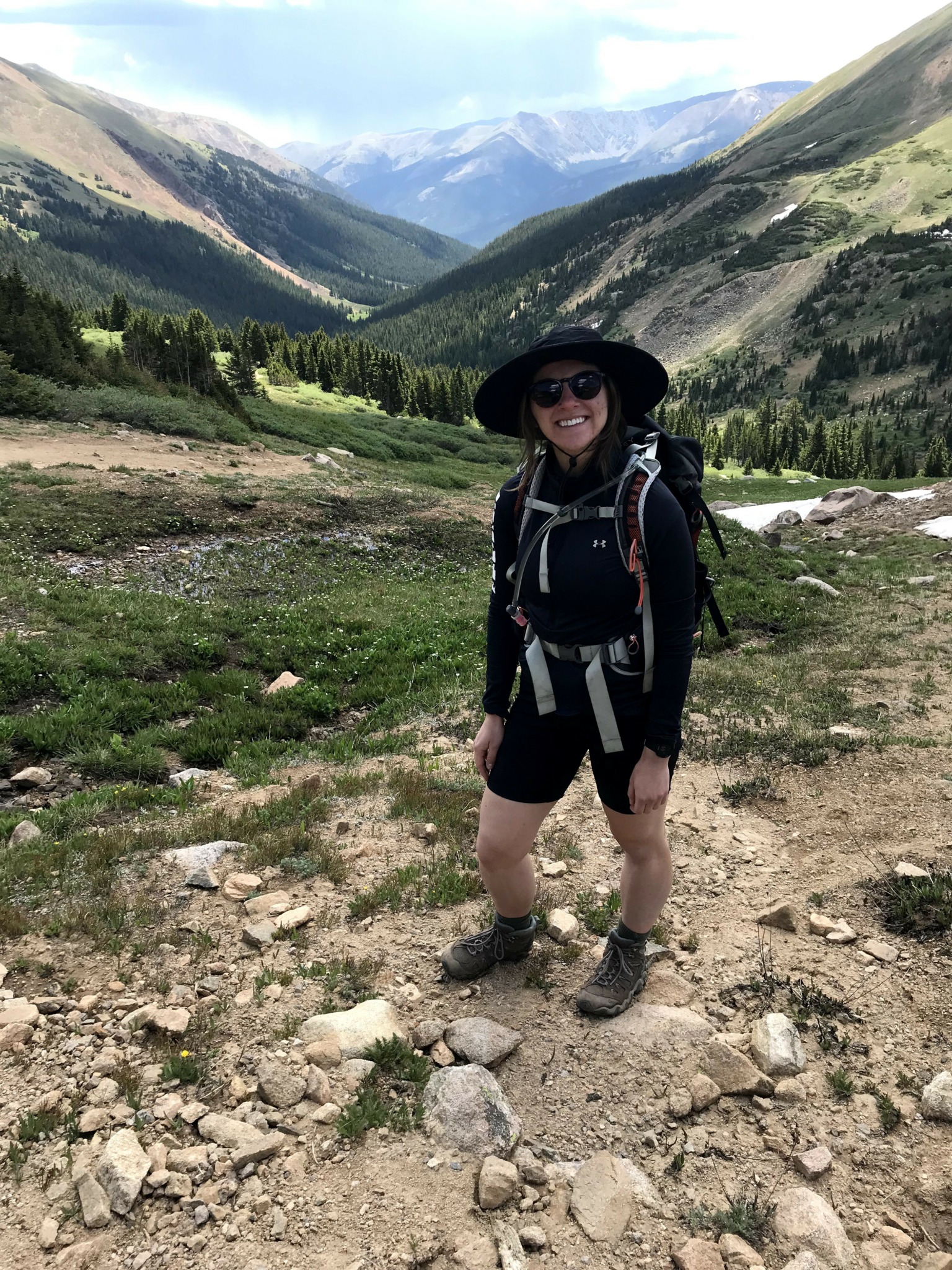We recently connected with Martha Carter and have shared our conversation below.
Alright, Martha thanks for taking the time to share your stories and insights with us today. It’s always helpful to hear about times when someone’s had to take a risk – how did they think through the decision, why did they take the risk, and what ended up happening. We’d love to hear about a risk you’ve taken.
I’ve always been a risk-taker. From moving from North Carolina to Colorado by myself to learning how to snowboard at age 30, I’ve leaned into challenges that pushed me out of my comfort zone. But what people don’t often talk about is how chasing your authentic dreams—the ones that matter most to you—can feel riskier than any of those external leaps.
The biggest risk I ever took was stepping into my first role as an individual therapist. At the time, I was working in a group therapy role, which felt familiar and safe. I was so close to staying in that role simply because it was what I knew. It felt so vulnerable to go after something I deeply wanted, rather than settling for what felt comfortable and easy. Expanding into a new role was terrifying. Keeping myself small and sticking to what I already knew would’ve been so much easier.
I was consumed by self-doubt and the fear that I’d be terrible at the job, especially since it was something I gave up a lot to pursue, and had dreamed about doing it for years. What if I disappointed myself? What if I wasn’t cut out for it? Worst of all, what if I hated it? These fears almost stopped me from taking the opportunity altogether. But despite my hesitation, I took the leap—and I’m so grateful I did.
That first step wasn’t just about starting a new job; it was about betting on myself. It was about trusting that I could figure things out, even if I stumbled. And now, I can’t imagine a more fulfilling or better-fitting career for me. The work I do is deeply aligned with who I am, and it brings a sense of purpose and connection that I wouldn’t trade for anything.
Taking that risk taught me that growth is almost always scary, but staying small comes at a much higher cost. I’m so glad I didn’t let fear dictate my path, and I remind myself of that lesson every time I face a new challenge.

Martha, before we move on to more of these sorts of questions, can you take some time to bring our readers up to speed on you and what you do?
I got into therapy by being a client first. I’ve always been someone who naturally gravitated toward caregiving—I can still remember sitting with bullied kids in middle school, making sure they felt seen and supported. It wasn’t until college, though, that I realized I needed support for myself. At the time, I thought I wanted to become a psychiatric nurse. But after starting therapy, I felt a deep calling to pursue this path myself. Therapy helped me understand myself in ways I hadn’t imagined, and I knew I wanted to provide that same kind of healing space for others. So, I shifted gears, earned my MSW, and embarked on a career as a therapist.
Over the years, I’ve worked in various settings, including eating disorder treatment, and I now offer individual therapy to help people heal from trauma and its many symptoms—like anxiety, overthinking, emotional numbness, and chronic pain. My services are tailored to meet clients where they are in their healing journey:
* **Immersive therapy sessions**: These offer a spacious, deep-dive healing experience for those who want to break through long-standing patterns or address complex issues in an accelerated format.
* **Nervous system resets**: Perfect for those seeking an emotional “tune-up” or who feel intimidated by traditional therapy. These sessions provide a gentle entry point to reconnecting with your body and emotions.
* **60-minute sessions**: For ongoing support and exploration, these sessions are a grounding space to process experiences, set goals, and build resilience.
* **Meal support sessions**: For those navigating eating disorders, I provide compassionate guidance during meals to help build healthier relationships with food and body.
I specialize in helping people who feel lost and disconnected—those who’ve learned to ignore their own needs and feelings just to get through life. Many of my clients wake up every morning with a sense of panic they can’t explain. They feel a constant rush to get things done but don’t know why, and they move through their days on autopilot, unsure of what they want or who they are.
Perhaps this sounds familiar:
* You feel so insecure in yourself that you constantly seek others’ approval, maybe even asking a friend what they’re wearing before leaving the house.
* Your inner voice is harsh and unforgiving, like an abusive drill sergeant, always pointing out your flaws.
* You carry a sense of failure, as if something is fundamentally wrong with you.
* You’re overwhelmed by emotions and escape through things like busy schedules, avoidance, or disordered eating behaviors.
* Your body feels like it’s working against you, with unexplained chronic pain or other symptoms that doctors can’t seem to fix.
What sets me apart is my somatic approach. Many people intellectualize or talk around their feelings as a way to avoid sitting with them—understandably so, because emotions can feel unbearable at times. I guide my clients into a deeper connection with their bodies, helping them gently sit with their emotions so they no longer feel the need to run from them. This work creates profound shifts, not just in how clients feel but in how they live.
My style resonates with people who want *real* change. I’m direct yet compassionate, and I don’t shy away from calling in patterns that may be keeping someone stuck. My ability to quickly connect the dots between someone’s past and how it’s playing out in their present is one of the things I’m most proud of—it’s where my insight and empathy come together to help clients gain clarity and move forward.
At the heart of what I do is the belief that healing isn’t about fixing what’s “broken.” It’s about addressing the wounds left by challenging childhood experiences or other trauma, and finding ways to move forward that feel grounded and authentic. My goal is to help you step out of survival mode, reconnect with your true self, and build a life that feels meaningful and aligned with who you are.
Other than training/knowledge, what do you think is most helpful for succeeding in your field?
Other than training and knowledge, the most helpful thing for succeeding in this field is cultivating the ability to be *present* with clients, rather than defaulting to *doing*. While interventions and tools have their place, true healing happens when we offer clients a grounded, attuned presence. It’s not about fixing or problem-solving—it’s about creating a space where clients feel safe, seen, and accepted as they are.
When we’re present, we help clients shift from a state of survival—where they’re stuck in fight, flight, freeze, or shutdown—into a state of calm and connection. This is the state where healing becomes possible, because the body and mind finally feel safe enough to let go of old patterns and process emotions.
But being present isn’t just about showing up; it requires us as therapists to do our own inner work. We have to regulate our own emotions and stay grounded, even when clients are sharing difficult or painful experiences. If we’re not present, if we’re distracted or overwhelmed, clients will sense it. They’ll feel it in the tone of our voice, in our body language, and in the energy we bring into the room.
On the flip side, when we’re fully present, clients can feel that safety. They know when we’re with them, truly listening, without judgment or an agenda. This presence teaches them, even on a subconscious level, that it’s okay to slow down and be with themselves. It’s okay to feel. It’s okay to trust that they’re not alone in this.
Presence is more powerful than any technique because it invites clients to step out of their survival mode and into a space of connection—not just with us, but with themselves. It’s this connection that creates the foundation for real and lasting change.
Are there any books, videos, essays or other resources that have significantly impacted your management and entrepreneurial thinking and philosophy?
One of the most significant resources that has impacted my thinking as a business owner has been investing in a business coaching group program. Social work school was focused on teaching me how to support clients, but it left out almost everything about running a business. This coaching program filled those gaps and has completely transformed how I approach my practice—not just as a therapist, but as an entrepreneur.
One of the biggest shifts has been in my mindset around money. I’ve learned to confidently charge rates that reflect the value of my work and the expertise I bring to the table, even in a field where premium fees and working outside of insurance are sometimes seen as controversial. It’s also changed how I think about investing in my business. For example, I’m considering hiring a virtual assistant in order to reclaim valuable time and energy that I could dedicate to client care and personal growth instead of admin tasks. I never would’ve considered doing something like this before the program.
Another incredible benefit has been being surrounded by like-minded therapists and entrepreneurs who are pushing their businesses to the next level. It’s both nourishing and inspiring to be in a community of people who understand the unique challenges of this field and who are redefining what’s possible, even in the face of traditional views about what therapists “should” do.
On a practical level, business coaching has taught me essential skills I didn’t even know I needed, like SEO and copywriting. SEO has made it easier for clients to find me, which means I can spend less time worrying about how to get clients and more time focusing on helping them. Copywriting, in particular, has been eye-opening because it’s so different from how therapists are trained to communicate. We’re used to open-ended, exploratory language, but copywriting requires clarity, specificity, and speaking directly to the needs of the people we want to help. Learning this skill has helped me connect more effectively with my ideal clients, ensuring the people I work with are the ones who resonate most with my approach.
Ultimately, business coaching has given me the tools to refine and expand my practice in ways that feel sustainable and aligned with my values. It’s helped me streamline the behind-the-scenes work, market my services more effectively, and structure my business in a way that allows me to focus on what I care about most: supporting my clients and creating a fulfilling, balanced life.
Contact Info:
- Website: https://marthacartertherapy.com
- Instagram: https://www.instagram.com/therapy.with.martha/
- Linkedin: https://www.linkedin.com/in/martha-carter-msw-lcsw-716237197/
- Other: https://www.psychologytoday.com/us/therapists/martha-carter-denver-co/1061265


